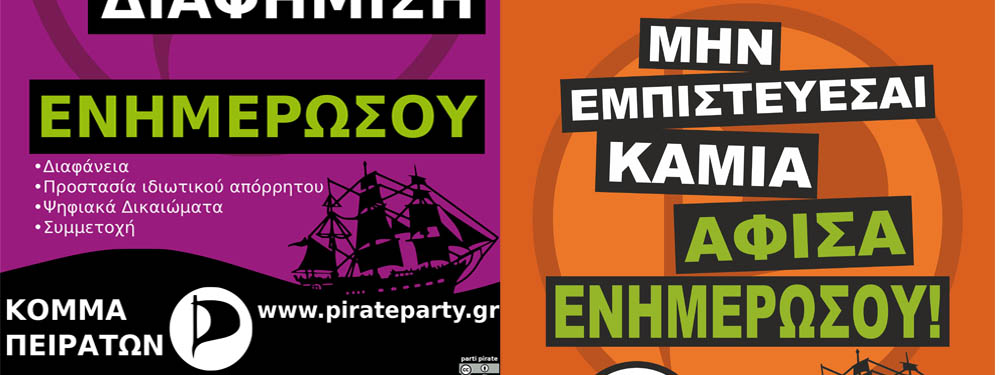
 Dass sich die griechischen Piraten von anderen Piraten etwas unterscheiden war dem Sperling schon lange klar, und das nicht alleine wegen Kristos. Aber das Sie zu zweit an zwei Orten ein Interview geben – das war dann schon etwas überraschend.
Dass sich die griechischen Piraten von anderen Piraten etwas unterscheiden war dem Sperling schon lange klar, und das nicht alleine wegen Kristos. Aber das Sie zu zweit an zwei Orten ein Interview geben – das war dann schon etwas überraschend.
Nun gut, der Sperling ist ja kein normaler Vogel sondern voll digital – einmal copy & paste löste das Problem. Er zwitscherte danach parallel mit Antonios Motakis in München und Stathis Leivaditis in Athen.
Introduction
The Pirate party of Greece (PP-GR) https://www.pirateparty.gr/ is 5 years old. It was founded on January 14, 2012, in Athens. PP-GR is organised in regions and cities through out the country and the local members have their own autonomy to activities related to the pirate movement.
The party is a member of PPI (since 2012), a founding member of the European Pirates (PP-EU), devoted to the core principles of the pirate movement and you can find our political statements and positions online https://www.pirateparty.gr/theseis/ (in Greek). Members of PP-GR have served and still serve, in the international bodies of PPI and PP-EU.
PP-GR hosted in Athens (November 2013) the event for the adoption of the Common European Election Programme for the Euroelections 2014.
The Interview
Sperling: Hello, how are you? And what are you doing in “real life”?
Antonios Motakis (AM): Hey! I’m a software engineer, curently living in Munich, Germany.
Stathis Leivaditis (SL): Hello! Thanks for inviting us! I’m a free lancer, former journalist, living in Chalkis, a city near Athens.
Sperling: Please tell me, what is your job in the Pirate Party of Greece and when/how do you get it?
AM: I have been serving as International Coordinator of the Party, and recently also have joined the Board, while also being a Board member of the European Pirates (PP-EU).
SL: I’ve been a member of the Board of PP-GR since 2012 and have served twice as a chairman. Also, I’ve served as a Board member of PPI (2014-2015) and since 2012 I’ve been a member of the team of the Pirate Times
 Sperling: How are the Greek Pirates organized?
Sperling: How are the Greek Pirates organized?
AM: Most powers reside with the party’s members. There is a permanent “Body of Members” that can table proposals and decide on almost anything. Most activities need to be aproved by this body. The few decisions the Body of Members are not allowed to take, can be decided upon in the yearly General Assembly of the party. Our goal is to have a democratic structure as much as is possible. The Board of the party can coordinate day to day activities, and put forward proposals to the members. A court of Arbitration also exists in order to resolve issues that come up, however its resolutions are also subject to aproval by the members.
Sperling: How many pirates are on board, can you tell me something about your members?
SL: Currently there are 7 members in the Board, all male, average age 40 years. According to our statutes we have a Board meeting once per month but in practice we meet more often.
Sperling: What kind of tools do you use for the internal organization of your political work?
AM: We rely heavily on our mailing lists, forum, etherpad, and Mumble. We also organize information on a wiki, and use a plethora of other tools. Our bylaws allow to put a proposal to a vote via either our Forum, or LiquidFeedback. We also have a Redmine instance running, but it has fallen out of favor. Now we tend to organize tasks using the Wiki and etherpad instead.
Sperling: Do you use a online-voting tool?
AM: We use LiquidFeedback and forum polls. If a secret verifiable vote is not required, then we tend to use online voting. The only exception being, our yearly General Assembly.
Sperling: Which channels you use in social media or the internet for contact with non-pirates, do you reach the poeple outside social media/internet?
SL: We are mainly on facebook, twitter, diasopra. Traditional media occasionally hosted articles and mentions to PP-GR. Also we organize events, like going out for beers, going to conferences, speeches, participate in protests.
Sperling: The Greek Political system is not well known in Germany and the news coverage in germany is not really correct. In some countrys there are the legal regulations and reality – how is it in Greece? Is there a chance for small partys to get involved in the system?
SL: Generally, Greek politics it’s like everywhere else in the democratic world, dominated by right, centre, socialist and left parties that occasionally got the power and have the luxury to hold offices in every city (in the past it was almost in every village).Their MP’s also got offices where they can meet with their voters and of course there is no comparison to the the small parties that got no financial aid from the state.
For the elected parties and MPs everything’s being paid by the state! For a party to enter the parliament there is a limit of 3% of the votes. In order to have a simple majority in the House, there’s a electoral law which gives a bonus of 50 seats to the 1st party! All these seats are being stolen from the votes of the small parties that end up with 2,9% and below and can’t have the chance to elect any MPs!
 For example, on the parliamentary elections of May 2012, PP-GR got 0,51% and could have elected 2 MPs in the parliament if there was a simple proportional, the most democratic election system. In the very same elections, the parties that didn’t make it to enter the House were up to 19% and that led Greek pirates to try and form a wider coalition, all together. We didn’t reach our purpose but we got some publicity on this and we are now in contact with a lot of those parties. Recently we organized a meeting on the Constitutional reform, in which 8 parties and 2 movements participated.
For example, on the parliamentary elections of May 2012, PP-GR got 0,51% and could have elected 2 MPs in the parliament if there was a simple proportional, the most democratic election system. In the very same elections, the parties that didn’t make it to enter the House were up to 19% and that led Greek pirates to try and form a wider coalition, all together. We didn’t reach our purpose but we got some publicity on this and we are now in contact with a lot of those parties. Recently we organized a meeting on the Constitutional reform, in which 8 parties and 2 movements participated.
Since 1974, when democracy re-established in Greece, only two parties share power exclusively – the right and the socialist, fully responsible for the current situation. They don’t want any small parties to ruin their power. To avoid this, they reached to the point to form a “monstrous” coalition and govern together, by the excuse to save the country!
But today it’s the same: There is a left and a right coalition including the Greens! In 2013 in our 2nd Congress in Thessaloniki, SYRIZA made an official proposition to PP-GR for co-operation but our members rejected it
AM: Participation in elections has a high barrier to entry for small parties in Greece. The cost to run in an election is 15-20 000 euros, and includes the cost of printing and distributing ballots, which is the party’s responsibility in Greece. On the other hand, the established parties enjoy some of the largest government subdidies inside the EU.
Sperling: We hear some “crazy” things about Syriza, who themes to be social and then surrended on the “Troika”. Is it possible for you to explain what was going on?
AM: I think we (Pirate Parties in Europe in general) have always been in favor of evidence based policy, especially for economic matters. In my view Syriza never proposed any concrete credible policy on how to overcome the situation the country finds itself. So it is really not surprising to me that Syriza has betrayed its promises.
In fact I’m afraid politicians in Greece and also in Europe, have abandoned the idea of credible policy making. Actually, producing credible policy proposals that respond to people’s problems is extremely hard; in Greece the Pirate Party is under increasing pressure to conform to people’s needs with economic policy positions, and a stance towards the “Troika”. As Pirates we should definitely have a word or two to say about this situation. Governmental accountability is one aspect; letting politicians get away with vague promises instead of doing the hard work leads to this kind of situation. This is true also outside of Greece; there are many aspects that are questionable, including transparency of the negotiations and likely much more.
SL: One would expect that a left government holds some key features that have to do with public health and education, defend the interests of workers and pensioners, and generally question the neoliberal system, especially in times of crisis. Before the elections, the euphemistically left party of SYRIZA promised – among many others – the tearing of memoranda, their removal by a simple law, the reducing of the tax burden. After the elections, the same party turned out to be the holdover of the previous right-socialist government scheme that took orders from the European Union, the IMF, Greece’s creditors and free markets.
Today left and right is an illusion, a determination that no longer exists. In essence, it is a whole system mixed by corporations and banks that impose the rules of the game. Media, politicians and parties in the House, only cultivate a supposedly trust to one or another government, that without them at the helm the country will be destroyed. The decisions are being taken at central level – from Brussels, in counsels with Berlin, Paris, Washington, etc. Citizens do not have the illusion that they could change things by voting for a leftist party. The question is who will have the power; Unfortunately, all other things about democracy destined to conferences and seminars.
This was – and still is – our world; Power lies on the hands of the very few. Whether it will continue to be such or not, is dependent on ourselves, how willing are we to change things. A real change can only come from the bottom of the society, the simple citizen, and towards that direction Pirate Party can have a catalytic role. Icelanders recently showed that to us very clearly! On the other hand, should the rest of the world understand that crisis in Greece is not only economic. Due to the austerity, it is social and humanitarian as well. But above all, it is the crisis of a system that has exceeded of its limits.
Sperling: Can you tell me which positions are the “central ideas” of the Greek Pirates? How do you communicate them to your voters?
AM: Our “central ideas” are not different from the other Pirate Parties, and include reform of intellectual rights law. Due to the situation the country is in, governmental accountability and transparency are a very strong focus for us.
SL: The participation of the citizens in desicion making by referenda physically or digitally, is one of our basic principles. We try to communicate our principles to the public by sending press releases to media, posting to our social media (twitter, facebook, etc), also our website.
 Sperling: What are your political achievements?
Sperling: What are your political achievements?
SL: On May 2012, just 4 months after the founding of PP-GR, we ran for the snap elections, not even knowing each other and we got 0,51% (32.519 votes). Please note that we didn’t have candidates in all of the regions! But we overpassed parties that have a 20 years presence in the Greek political scene!
Also in Euroelections 2014 we got 0,90% in coalition with the “Ecologist Greens” and ranked 14th out of 42 parties. In the elections of September 2015 PP-GR got 0,28% but there was a low turnout, only 56,16% voted. Ιn June 2015, PP-GR decided to adopt “Coppersurfer”, providing political support to one of the largest torrent trackers on the Internet, after it has been targeted by copyright holders throughout Europe. Also, I would like to mention about “Pirates in Education“, a indepedent union of teachers which is related to Pirate party’s core principles. “Pirates in Education” have a representative elected in Aristotles’ Board, one of the greatest teachers’ association in Athens and now in ADEDY, the supreme union of Greek civil servants!
Sperling: Did the Media report about you? Did they report of the success of the iceland pirates?
SL: Occasionally national and local media, TV channels, radio stations and newspapers, report about PP-GR. Of course all mainstream media reported on the big electoral success of Pirate party of Iceland.
Sperling: Is there anything you want to tell us about you, the Greek Pirates, the universe or the rest of all?
SL: We believe that a basic raison d’être of a party is to compete for its ideas with other parties and run for the elections. And in Greece, unexpected elections is more than accustomed! Since 2010, almost every 2 years we have snap elections. But to run for the elections is of a high cost. We would like to call on to other Pirate parties around the world for solidarity and donations. You can donate at https://www.pirateparty.gr/donate/
Sperling: Thank you for your time, we hope we hear about you in the coming years!
AM: Thank you for the opportunity to talk to you!
SL: Thanks for the interview!
Redaktionsmitglied Sperling
Redakteur seit 2011, Kernteam der Redaktion seit 2013. De facto "Leitung" ab 2016, irgendwann auch offiziell Chefredakteur - bis 2023. Schreibt nur noch wenn ihm die Laune danach steht, zahlt aktuell die Infrastruktur der Flaschenpost, muss aber zum Glück nicht haften 🙂








